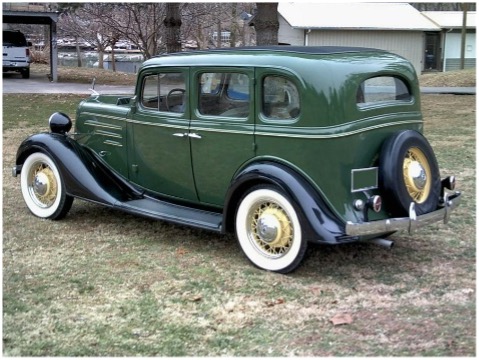
The Car
By Farrell Fand
The old neighborhood in Newark isn’t the same anymore. Just about everything has changed. The street, Belmont Avenue, now Irvine Turner Boulevard, is very different. It’s not a very wide street, but back in 1948, when I was seven, it looked like a huge expanse to me. The new two family house that now stands on the property has the same back yard, but the row of five connected wooden garages is gone, replaced with grass. All that’s left of the former buildings is the number.
Times were different back then. Children were told to “go out and play,” and parents didn’t feel they needed to worry about their safety. There was no such thing as a child saying, “I’m bored.” It was expected that kids would figure out what to do to keep ourselves occupied, and we did.
And did we stay out of trouble? Well, that’s a whole other thing.
“Hey Georgeeeeey! Hey Georgeeeeeeeey!” I was shouting from Georgie’s backyard, up to the third floor apartment where he lived. That was how we called for each other in the neighborhood. No one would ever think of using the phone. That was for adults. It usually didn’t take more than two tries to get him downstairs to play.
“Hi Chuck. What do you want to do?”
“I don’t know. Let’s go play in my backyard. We can have a war with our soldiers. That’d be fun.” We both had lots of toy metal soldiers stored in our houses. Why metal? Plastic hadn’t been invented yet.
“That’s good,” Georgie said. “I’ll go get mine and you get yours; then I’ll come over. I got some new ones yesterday. Wait ‘til you see them.”
“O.K. Come right over.”
“Bang, bang, bang, eh, eh, eh, eh! Your guy’s dead, Chuck.”
“No he’s not. You missed him.”
“Did not!”
“Did too!”
Arguments like that could continue for quite a while, but ten minutes was more than enough this time. “Georgie, let’s do something else. We could go to Mrs. Smith’s garden and try to catch some bees. I have a jar in my back hall that we can use. We’d have to be really quiet, because she almost caught me last time and I’m really afraid of her.”
“Nah, Chuck, I don’t feel like it. What else can we do?”
“I don’t know. I guess we could play marbles, but Stephen and John-Thomas both went away for a few days and you need at least four kids to play a good game of marbles.”
“I don’t feel like playing marbles either. There must be something else around that we can do, Chuck. Let’s think!”
“Hey Georgie, look over there. One of the garage doors is open a little! They’re never open. Everybody locks them. I wonder what’s inside. Should we go over and peek in? What do you think?”
“Well,” said Georgie, “We’re not supposed to go near those garages. We could get into trouble.”
“O.K., you’re right. We could get into really big trouble. But that door’s open enough for us to just take a look inside. That wouldn’t be wrong, would it?”
“Let’s just take a quick peek, Chuck. That can’t be wrong. We won’t even touch the door. No one will ever know, right?”
“O.K. This is really fun, isn’t it? It’s like we’re detectives. Let’s see what’s in there.”
“Oooh look!” said Chuck. “It’s a car. It’s beautiful! It has four doors and it’s so shiny. This must be Mr. Matucci’s car. He comes here every weekend and takes it out for a drive. I guess it just stays in this garage the rest of the time. Wow!”
“I wonder if we squeezed inside, just to get a little closer, would that be all right? We wouldn’t touch anything, and we could get to see all of it. We sure can’t see all of it from out here. Let’s go in…”
“Chuck, look at that roof! Is that made of some kind of leather or something? You know, we can see it best if we get right up onto the car. Then, we’ll get a good look. It sure looks special.”
“Be careful climbing on the hood, Georgie. We don’t want to scratch it or anything. We’re just going to look at that roof. I’ll bet it’s leather or some other stuff. This is a fancy car!”
“I can’t believe how high we are. This is a really high car, isn’t it? I think this is the highest I’ve ever climbed. And look at this roof. Wow! I’m not sure what it’s made of. I can’t tell,” Chuck said.
“But look at this, Chuck. This one corner isn’t stuck down completely. It’s a teeny bit lifted off of the roof. I’m going to try to push it down, to fix it. Look at us, fixing a car. This is so great, isn’t it?”
“Wait a minute, Georgie; this corner doesn’t look right either. Let’s just pull both corners up a little bit, and then we can see if we can get it to fit right.”
“Chuck, you have to pull your side harder. Look, I’m pulling with all my might. This corner is pretty stuck on the roof. Let’s pull together. O.K., one, two, three PULL!”
“Oh no! Georgie, we pulled too hard! Half of the roof came off. What are we gonna do now? Oh boy, we’re gonna be in so much trouble!”
“I know what. Let’s get out of here! Run!” and we did.
The Next Sunday
Joe Matucci’s car was a perfectly restored 1935 Chevrolet four door sedan. He had spent more than a year refurbishing it to its original condition. The next day, Sunday, was the day he was going to show it off and get recognized for his accomplishment. The car was perfect! It looked like it belonged on a showroom floor as if it were a new car. Joe didn’t have any children and this amazing car was his baby, so to speak.
He got to the garage behind the house at 490 Belmont Avenue, really eager to get on the road. At first, he noticed that the door was unlocked. Could he have forgotten to put the padlock on last week? But, this was a really safe neighborhood. The lock was more for appearances than anything else.
Then, he noticed that the door was ajar, which was strange. He threw it open and saw his beautiful car with half of its roof sticking up in the air! “No! No, no, no, no, no! What happened?” He didn’t even know what to say. Then, he looked closer and noticed small footprints on the hood. He could feel his blood boiling. “Who would do something like that?” he fumed. “Why would anyone mutilate a beautiful car like this one?” he screamed.
After questioning some of the neighbors and, with the help of the landlady, Mr. Matucci came to a conclusion about who had damaged his car.
He told our parents about what had happened and that it looked like Georgie and I were the vandals. When we were confronted with the accusation, we both made tearful admissions about what we had done.
We explained that we had thought we were fixing the car. Pulling up the roof like we did was really an accident. Of course, that explanation didn’t cover our going into the garage in the first place and then climbing up onto the car’s roof.
Our parents were furious with us, and agreed to pay for any repairs. Mr. Matucci, still upset with what had happened, moved his beloved car to another garage, in a different neighborhood.
Georgie and I thought that the whole incident was finished, but then our parents called us together and we had a group meeting. Georgie’s dad spoke for all four of the parents. “We know that you two boys are really good and usually follow rules, but this time, you can see what happened when you didn’t follow them.
“Both of our families have to pay for the damage you’ve done. It’s obvious that you two can’t afford all of that cost, but there are consequences for your actions. First, both of you won’t be getting your allowance for four weeks. That money will go toward repairing the damage.
“Since Mr. Matucci is moving his car to a different garage, it won’t be available, but our families’ two cars will and we’re going to use our cars to teach you respect for cars and for other people’s property. Every Sunday, for the next five weeks, both of you are going to wash our families’ cars. If it rains, you’ll do it the next dry day.
“Don’t even try to complain about it. That’s a final decision from all four of your parents. The washing starts this coming Sunday.”
Georgie and I spent many long hours washing cars and talking about how we didn’t want to get into trouble ever again.
Looking back on that time and what we did, I’m surprised at how events in one’s youth can foreshadow what’s to come later in life. After a while, as we grew up, Georgie and I lost contact with each other, not because of any argument or disagreement. We just drifted. I don’t even know where he lives now.
I’m amazed at how things have turned out for me. Here I am, 75 years old, and a successful businessman. I never could have guessed that my success would be in automated car washes. I own seven of them, all in different locations around the state. Who would have thought, all those years ago, that I would wind up washing cars just about all of my adult life?
